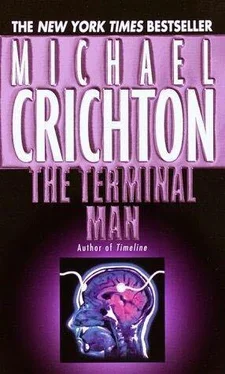Michael Crichton - The Terminal Man
Здесь есть возможность читать онлайн «Michael Crichton - The Terminal Man» весь текст электронной книги совершенно бесплатно (целиком полную версию без сокращений). В некоторых случаях можно слушать аудио, скачать через торрент в формате fb2 и присутствует краткое содержание. Жанр: Фантастика и фэнтези, на английском языке. Описание произведения, (предисловие) а так же отзывы посетителей доступны на портале библиотеки ЛибКат.
- Название:The Terminal Man
- Автор:
- Жанр:
- Год:неизвестен
- ISBN:нет данных
- Рейтинг книги:3 / 5. Голосов: 1
-
Избранное:Добавить в избранное
- Отзывы:
-
Ваша оценка:
- 60
- 1
- 2
- 3
- 4
- 5
The Terminal Man: краткое содержание, описание и аннотация
Предлагаем к чтению аннотацию, описание, краткое содержание или предисловие (зависит от того, что написал сам автор книги «The Terminal Man»). Если вы не нашли необходимую информацию о книге — напишите в комментариях, мы постараемся отыскать её.
The Terminal Man — читать онлайн бесплатно полную книгу (весь текст) целиком
Ниже представлен текст книги, разбитый по страницам. Система сохранения места последней прочитанной страницы, позволяет с удобством читать онлайн бесплатно книгу «The Terminal Man», без необходимости каждый раз заново искать на чём Вы остановились. Поставьте закладку, и сможете в любой момент перейти на страницу, на которой закончили чтение.
Интервал:
Закладка:
Janet Ross usually took pleasure in the freeways. There had been times when she had driven home from the hospital at night, with the big green signs flashing past overhead, and the intricate web of overpasses and underpasses, and the exhilarating anonymous speed, and she had felt wonderful, expansive, free. She had been raised in California, and as a child she remembered the first of the freeways. The system had grown up as she had grown, and she did not see it as a menace or an evil. It was part of the landscape; it was fast; it was fun.
The automobile was important to Los Angeles, a city more technology-dependent than any in the world. Los Angeles could not survive without the automobile, as it could not survive without water piped in from hundreds of miles away, and as it could not survive without certain building technologies. This was a fact of the city's existence, and had been true since early in the century.
But in recent years Ross had begun to recognize the subtle psychological effects of living your life inside an automobile. Los Angeles had no sidewalk cafes, because no one walked; the sidewalk cafe, where you could stare at passing people, was not stationary but mobile. It changed with each traffic light, where people stopped, stared briefly at each other, then drove on. But there was something inhuman about living inside a cocoon of tinted glass and stainless steel, air-conditioned, carpeted, stereophonic tape-decked, power-optioned, isolated. It thwarted some deep human need to congregate, to be together, to see and be seen.
Local psychiatrists recognized an indigenous depersonalization syndrome. Los Angeles was a town of recent emigrants and therefore strangers; cars kept them strangers, and there were few institutions that served to bring them together. Practically no one went to church, and work groups were not entirely satisfactory. People became lonely; they complained of being cut off, without friends, far from families and old homes. Often they became suicidal - and a common method of suicide was the automobile. The police referred to it euphemistically as "single unit fatalities." You picked your overpass, and hit it at eighty or ninety, foot flat to the floor. Sometimes it took hours to cut the body out of the wreckage…
Moving at sixty-five miles an hour, she shifted across five lanes of traffic and pulled off the freeway at Sunset, heading up into the Hollywood Hills, through an area known locally as the Swish Alps because of the many homosexuals who lived there. People with problems seemed drawn to Los
Angeles. The city offered freedom; its price was lack of supports.
She came to Laurel Canyon and took the curves fast, tires squealing, headlamps swinging through the darkness. There was little traffic here; she would reach Benson's house in a few minutes.
In theory, she and the rest of the NPS staff had a simple problem: get Benson back before six o'clock. If they could get him back into the hospital, they could uncouple his implanted computer and stop the progression series. Then they could sedate him and wait a few days before relinking him to a new set of terminals. They'd obviously chosen the wrong electrodes the first time around; that was a risk they accepted in advance. It was an acceptable risk because they expected to have a chance to correct any error. But that opportunity was no longer there.
They had to get him back. A simple problem, with a relatively simple solution - check Benson's known haunts. After reviewing his chart, they'd all set out to different places. Ross was going to his house on Laurel. Ellis was going to a strip joint called the Jackrabbit Club, where Benson often went. Morris was going to Autotronics, Inc., in Santa Monica, where Benson was employed; Morris had called the president of the firm, who was coming to the offices to open them up for him.
They would check back in an hour or so to compare notes and progress. A simple plan, and one she thought unlikely to work. But there wasn't much else to do.
She parked her car in front of Benson's house and walked up the slate path to the front door. It was ajar; from inside she could hear the sound of laughter and giggles. She knocked and pushed it open.
"Hello?"
No one seemed to hear. The giggles came from somewhere at the back of the house. She stepped into the front hallway. She had never seen Benson's house, and she wondered what it was like. Looking around, she realized she should have known. From the outside, the house was an ordinary wood-frame structure, a ranch-style house as unobtrusive in its appearance as Benson himself. But the inside looked like the drawing rooms of Louis XVI - graceful antique chairs and couches, tapestries on the walls, bare hardwood floors.
"Anybody home?" she called. Her voice echoed through the house. There was no answer, but the laughter continued. She followed the sound toward the rear. She came into the kitchen - antique gas stove, no oven, no dishwasher, no electric blender, no toaster. No machines, she thought. Benson had built himself a world without any sort of modern machine in it.
The kitchen window looked out onto the back of the house. There was a small patch of lawn and a swimming pool, all perfectly ordinary and modern, Benson's ordinary exterior again. The back yard was bathed in greenish light from the underwater pool lights. In the pool, two girls were laughing and splashing. She went outside.
The girls were oblivious to her arrival. They continued to splash and shriek happily; they wrestled with each other in the water. She stood on the pool deck and said, "Anybody home?"
They noticed her then, and moved apart from each other.
"Looking for Harry?" one of them said.
"Yes."
"You a cop?"
"I'm a doctor."
One of the girls got out of the pool lithely and began toweling off. She wore a brief red bikini. "You just missed him," the girl said. "But we weren't supposed to tell the cops. That's what he said." She put one leg on a chair to dry it with the towel. Ross realized the move was calculated, seductive, and demonstrative. These girls liked girls, she realized.
"When did he leave?"
"Just a few minutes ago."
"How long have you been here?"
"About a week," the girl in the pool said. "Harry invited us to stay. He thought we were cute."
The other girl wrapped the towel around her shoulders and said, "We met him at the Jackrabbit. He comes there a lot."
Ross nodded.
"He's a lot of fun," the girl said. "A lot of laughs. You know what he was wearing tonight?"
"What?"
"A hospital uniform. All white." She shook her head. "What a riot."
"Did you talk to him?"
"Sure."
"What did he say?"
The girl in the red bikini started back inside the house. Ross followed her. "He said not to tell the cops. He said to have a good time."
"Why did he come here?"
"He had to pick up some stuff."
"What stuff?"
"Some stuff from his study."
"Where is the study?"
"I'll show you."
She led her back into the house, through the living room. Her wet feet left small pools on the bare hardwood floor.
"Isn't this place wild? Harry's really crazy. You ever heard him talk about things?"
"Yes."
"Then you know. He's really nutty." She gestured around the room. "All this old stuff. Why do you want to see him?"
"He's sick," Ross said.
"He must be," the girl said. "I saw those bandages. What was he, in an accident?"
"He had an operation."
"No kidding. In a hospital?"
"Yes."
"No kidding."
They went through the living room and down a corridor toward the bedrooms. The girl turned right into one room, which was a study - antique desk, antique lamps, overstuffed couches. "He came in here and got some stuff."
"Did you see what he got?"
"We didn't really pay much attention. But he took some big rolls of paper." She gestured with her hands. "Real big. They looked like blueprints or something."
Читать дальшеИнтервал:
Закладка:
Похожие книги на «The Terminal Man»
Представляем Вашему вниманию похожие книги на «The Terminal Man» списком для выбора. Мы отобрали схожую по названию и смыслу литературу в надежде предоставить читателям больше вариантов отыскать новые, интересные, ещё непрочитанные произведения.
Обсуждение, отзывы о книге «The Terminal Man» и просто собственные мнения читателей. Оставьте ваши комментарии, напишите, что Вы думаете о произведении, его смысле или главных героях. Укажите что конкретно понравилось, а что нет, и почему Вы так считаете.









